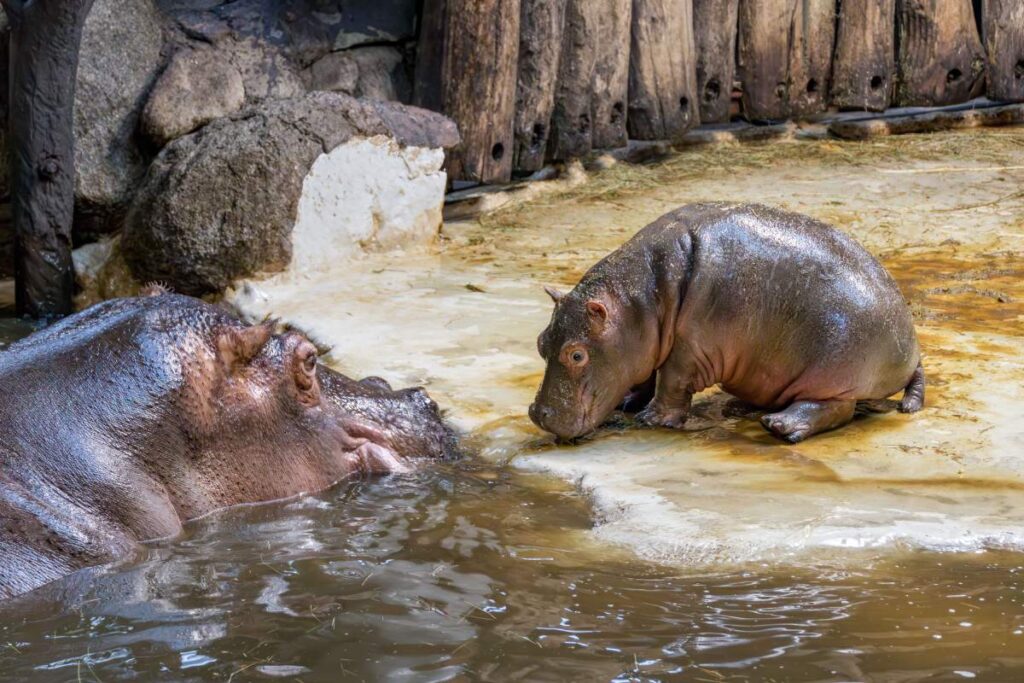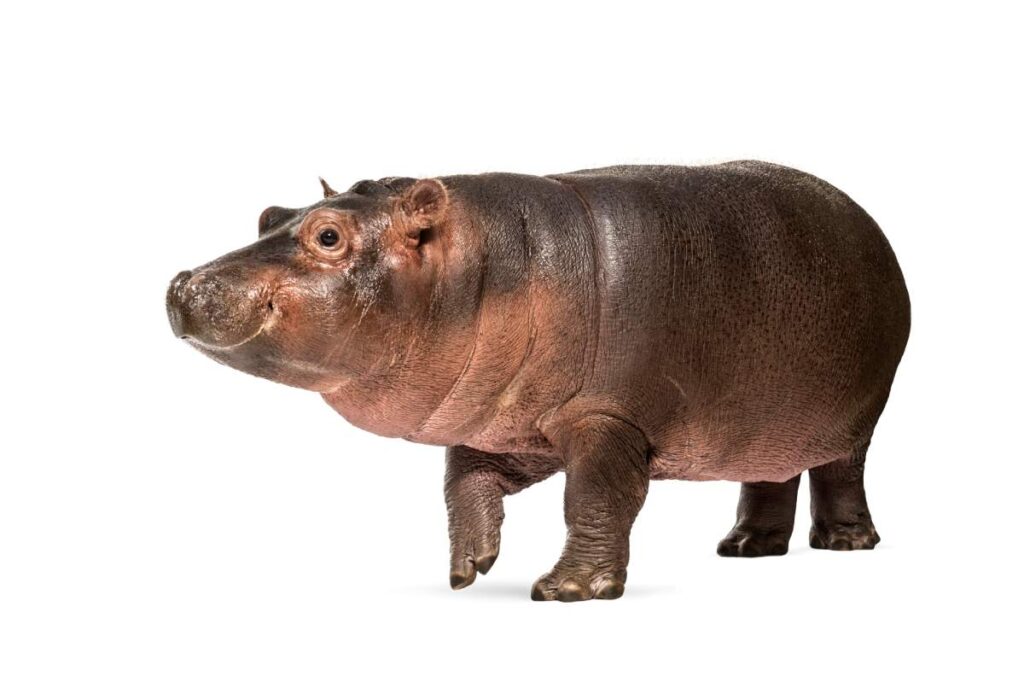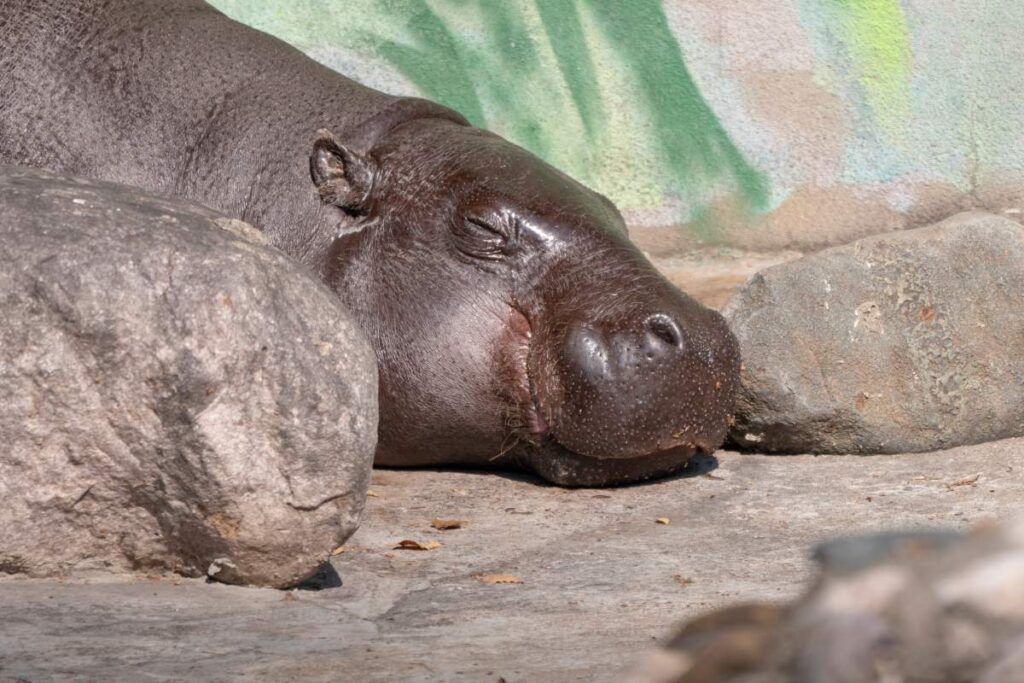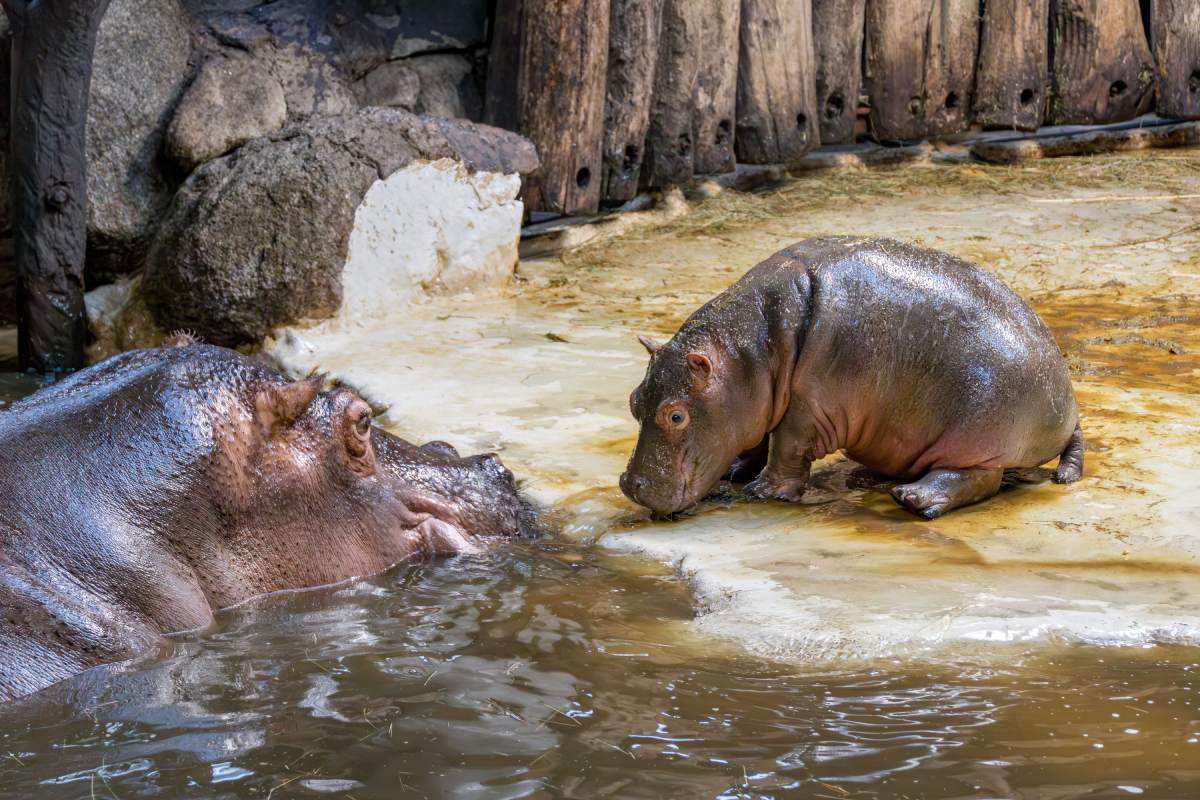In a world dominated by cats, dogs, and other domestic animals, it’s rare to see an unlikely star like Nong Moo Deng—a pygmy hippo—rise to viral fame. Hailing from Khao Kheow Open Zoo in Thailand, Moo Deng has captured hearts across the globe with his adorable appearance, gentle nature, and playful antics.
His newfound popularity on social media has not only made him an internet sensation but also shed light on the often-overlooked plight of pygmy hippos and the vital role conservation efforts play in preserving species like him.
The Origin of Nong Moo Deng’s Name and Viral Fame
The name “Nong Moo Deng” translates to “bouncing pig” in Thai, an affectionate nickname given to this little hippo, perhaps due to his round and chubby appearance. In Thai culture, giving animals quirky and endearing names is a way to express fondness, and Moo Deng’s name reflects the characteristic and affection she’s received from caretakers and visitors alike.

It wasn’t long before Moo Deng started gaining popularity online. In early 2024, videos of the pygmy hippo began circulating on social media platforms like TikTok, Instagram, and Facebook, where viewers couldn’t get enough of his charming and clumsy behaviour. Whether Moo Deng was seen lounging in his pool, nibbling on vegetables, or interacting with zookeepers, each post brought more attention to his adorable personality. Soon, she became a social media icon, and his fame transcended Thailand, spreading worldwide.
What makes Moo Deng’s viral journey particularly significant is that pygmy hippos aren’t as commonly known or appreciated as other exotic animals. While many are familiar with the large, common hippopotamus, the pygmy hippo remains a relatively obscure species. Moo Deng’s popularity opened the door for people to learn more about these fascinating creatures, and in turn, about the conservation efforts needed to protect them.
Meet the Pygmy Hippo: Lesser-Known Cousins of the Common Hippo
Pygmy hippos (Choeropsis liberiensis) are quite different from their larger cousins, the common or Nile hippos. Native to the forests and swamps of West Africa, pygmy hippos are much smaller in size, weighing between 180 to 275 kg compared to the common hippo, which can weigh up to 3,200 kg. Pygmy hippos are also far more elusive and shy, spending most of their time in dense forests and near water sources, which makes them harder to spot in the wild.
While they share some similarities with common hippos—such as semi-aquatic habits and a mostly herbivorous diet—pygmy hippos lead a more solitary life. They are often seen alone or in pairs, avoiding the large social groups that common hippos tend to form. Their smaller size and more delicate features, including shorter legs and a more streamlined body, make them incredibly endearing, which explains part of Moo Deng’s viral appeal.

However, despite their charming appearance, pygmy hippos are classified as “Vulnerable” on the International Union for Conservation of Nature (IUCN) Red List. Their populations have been in decline due to habitat destruction caused by deforestation, human settlement expansion, and illegal poaching. It’s estimated that fewer than 3,000 pygmy hippos remain in the wild, primarily found in Liberia, Sierra Leone, Guinea, and Ivory Coast. Conservation efforts are crucial to ensuring the survival of this species, and Moo Deng’s rise to fame helps put a spotlight on the importance of protecting these unique animals.
Khao Kheow Open Zoo: A Conservation Hub
Khao Kheow Open Zoo, located in Chonburi, Thailand, has long been a leading facility for animal conservation and education. The zoo’s mission goes beyond providing a home for animals—it actively works on breeding programs for endangered species, public education, and wildlife research. Moo Deng is just one of many animals in their care, but his viral fame has brought unparalleled attention to the zoo’s efforts.
Khao Kheow’s approach focuses on creating a more natural environment for the animals, allowing them to thrive in conditions that closely resemble their natural habitats. Moo Deng, like other animals at the zoo, is cared for by a dedicated team of zookeepers who work to ensure his well-being. From a carefully monitored diet to enriching activities that stimulate his natural instincts, Moo Deng is provided with a high standard of care. The zoo also prioritizes educating visitors about the importance of wildlife conservation, and Moo Deng’s viral status has made this message even more powerful.
Through breeding programs, zoos like Khao Kheow play a vital role in preserving endangered species. While it’s always preferable for animals to live in the wild, many species, like the pygmy hippo, face such significant threats that captive breeding programs may be their only hope for survival. By raising awareness through animals like Moo Deng, the zoo encourages more people to become invested in conservation efforts.

The Role of Social Media in Wildlife Conservation
Moo Deng’s viral fame is a testament to the power of social media in promoting wildlife conservation. In the digital age, social platforms have become more than just a place for entertainment; they are powerful tools for raising awareness about important causes. Videos and photos of animals like Moo Deng allow people from all over the world to connect with creatures they may have never heard of before.
In Moo Deng’s case, his cute and engaging videos brought pygmy hippos into the global spotlight. With each share, comment, and like, people learn more about the species and the dangers they face in the wild. Social media has the unique ability to reach younger generations, who are increasingly concerned about environmental issues. As they engage with content like Moo Deng’s, they’re inspired to learn more about conservation and take action to protect endangered species.
Beyond awareness, the viral nature of Moo Deng’s fame has also had a direct impact on the zoo’s visitation and donations. Khao Kheow Zoo saw a spike in visitors curious to see the famous hippo in person, which in turn supports the zoo’s ongoing conservation efforts. Increased media attention can also lead to more funding for endangered species programs, making social media a valuable asset in the fight to preserve wildlife.
The Bigger Picture: Why Moo Deng’s Story Matters
Moo Deng is more than just a viral sensation—she’s a reminder of the importance of wildlife conservation and the critical role zoos and breeding programs play in protecting endangered species. His rise to fame brings attention to the vulnerability of pygmy hippos, a species that might otherwise go unnoticed by the global public.
As deforestation and habitat loss continue to threaten animals worldwide, stories like Moo Deng’s help humanize the issue, making it easier for people to connect with the cause. It’s not just about saving one cute hippo—it’s about ensuring that future generations will have the opportunity to witness the diversity of life on Earth.
In the end, Nong Moo Deng’s charm may have won him viral fame, but his legacy will hopefully inspire a broader movement toward wildlife conservation. With each post, video, and like, we come one step closer to ensuring that species like the pygmy hippo don’t just survive but thrive.




